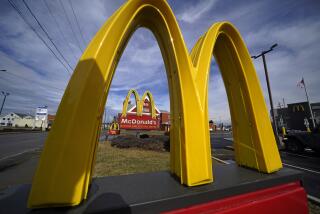Strike, Costs Take Toll on Mondavi
- Share via
Profit growth evaporated at Robert Mondavi Corp. in the last quarter, as the Oakville, Calif.-based winemaker struggled with widespread discounting and Southern California’s protracted supermarket strike took a toll on sales.
Mondavi, a bellwether for California’s wine industry, was particularly hurt by the slowing sales of its workhorse Woodbridge brand, a staple of the company’s supermarket business.
The winemaker reported net income of $9.4 million, or 57 cents a share, for its fiscal second quarter ended Dec. 31, compared with net income of $9.7 million, or 59 cents, for the same period a year earlier. The results included an after-tax $3.9-million charge for the sale of Mondavi’s share of a joint venture in Chile.
The dip in profit was in sharp contrast to Mondavi’s performance in the previous quarter, when profit rose 21% to $9.8 million, or 60 cents a share.
In its second quarter, Mondavi said Thursday that revenue grew by 4% to $147.3 million, reflecting gains for the flagship Robert Mondavi label. But Woodbridge, which accounts for more than half of Mondavi’s revenue and about 75% of sales volume, continued to lose ground. Woodbridge shipments fell 2% to 2.3 million cases, and revenue from the brand dipped 4% to $77.3 million. The average wholesale price per case fell 2%.
Woodbridge, which sells for $5 to $7 a bottle, has been hurt by competition from inexpensive imports from Australia and Italy and the growth of domestic “super value” labels such as the $1.99 Charles Shaw brand sold at the Trader Joe’s chain.
Another culprit: the disruption of shopping patterns caused by the 15-week-old supermarket strike. Sales of domestic wine in Southern California food stores plunged 24% in the 13 weeks ended Dec. 20 compared with the previous 13-week period, according to research firm AC Nielsen, whose data do not include such important retail channels as Costco Wholesale Corp., Cost Plus Inc. and Trader Joe’s.
For Woodbridge, that translated to 30,000 fewer cases sold, or about 1% of the company’s business during the latest quarter, said Greg Evans, Mondavi’s chief executive.
“In the scheme of things, 1% has not created an enormous business issue for us,” Evans said. “Those sales should come back once the strike ends.”
Nonetheless, investors were skittish. Mondavi’s stock fell 4.9%, or $1.91, to $36.74 on Nasdaq.
“We continue to be troubled by weak performance on the part of [Mondavi’s] core Woodbridge brand,” Marc Cohen, a Goldman Sachs analyst, wrote in a note to investors.
The market also was spooked by the company’s plan to delay the release of its $125-a-bottle 2001 reserve Cabernet Sauvignon, a move that will shift earnings from its fiscal third quarter to the fourth. Although the third quarter will take a hit, the switch won’t affect Mondavi’s full-year results, analysts said.
The change in timing for the release of Mondavi’s most famous wine will allow the company to match the release dates of other marquee wineries, Evans said, and would also give the 2001 vintage more time to age. Wine enthusiasts say the 2001 red vintage from Napa Valley is generally considered to be one of the best in the last decade.
Despite Mondavi’s trouble with Woodbridge, the long-term outlook for the company and the wine industry is generally good, analysts said.
Tim Ramey of investment banking firm D.A. Davidson in Portland, Ore., continues to maintain a $40 price target for the stock.
Wine prices are expected to firm this year as consumption continues to grow. This week, Adams Beverage Group, which tracks alcoholic beverage sales, said U.S. per capita wine consumption hit a record 2.68 gallons in 2003, up from 2.56 gallons in the prior year. Overall wine sales rose by nearly 5%.
More to Read
Inside the business of entertainment
The Wide Shot brings you news, analysis and insights on everything from streaming wars to production — and what it all means for the future.
You may occasionally receive promotional content from the Los Angeles Times.











